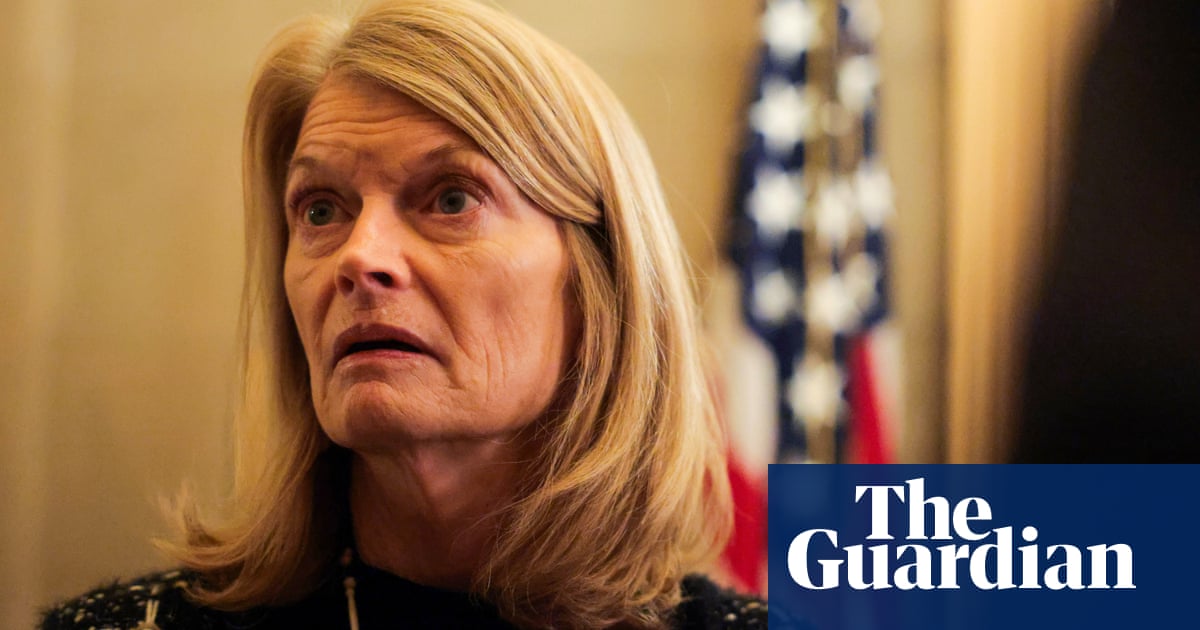Lisa Murkowski isAlaska’s four-term senator, first appointed in 2002 by Frank Murkowski, her father and the state’s governor. An avowed moderateRepublican, she entertains the possibility of caucusing with theDemocratsif the Senate emerges deadlocked from next year’s midterms. Her relationship withDonald Trumpis fraught.
In 2016, she voted for the former Ohio governor John Kasich. In Far From Home, her first book, she writes: “One of my simple rules … has been to withhold my vote from any candidate of bad character, regardless of the politics.”
Trump … failed the test.
In office, Murkowski clashed with him over the attempted repeal of the Affordable Care Act, AKA Obamacare, and the nomination of Brett Kavanaugh to the supreme court. Trump trashed her (to Don Young, then Alaska’s congressman) as “that bitch Murkowski”. Young and Murkowski were allies. It made no difference to the president.
At Trump’s second impeachment trial, Murkowski voted to convict. Out of office, he attempted to doom her 2022 re-election – and failed. Still, of the seven Republican senators who voted to convict, only Murkowski, Susan Collins of Maine and Bill Cassidy of Louisiana remain in Congress.
Subtitled An Alaskan Senator Faces the Extreme Climate of Washington, Murkowski’s memoir sheds light on her life, family and career, brimming with anecdotes and grudges. Well-paced and informative, with an assist fromCharles Wohlforth, a seasoned Alaska writer and politico, the book offers a window into Murkowski’s mind.
“I call myself a Republican because of the values I hold, such as personal responsibility, small government, a strong national defense, and the individual’s right to make her own choices,” she writes. Along with Collins, she is the last of that tribe. The geographic and ideological centers of the GOP reside in the Rust belt and the south, not in New England and Alaska.
Murkowski is wary of populism and shows little respect for Sarah Palin, the former Alaska governor who was the Republican nominee for vice-president in 2008. Two consecutive sentences sum up her take.
“Sarah Palin didn’t know she was helping start a movement – she was just being Sarah Palin – but she became the prototype forDonald Trump, the showman without principle,” Murkowski observes, acidly. “And he took populism much further, partly because he didn’t need a script.”
Murkowski viewed Palin as both lazy and a dim bulb, unfit for higher office.
“I would have warned John McCain about selecting her as his vice-presidential running mate if I had given any credence to the rumors that he was considering Palin,” Murkowski writes. “I did not, because I thought the idea was preposterous.”
Palin failed to complete her term as governor, resigning in summer 2009, as she faced ethics investigations and growing legal bills. More recently, she has lost in two attempts to sue the New York Times for defamation.
In 2010, Murkowski lost the Republican primary but won in November as a write-in. After the initial loss, Joe Biden, then vice-president, called to console her. “Goddamn it, what were those people thinking?” he said.
Murkowski devotes considerable space to the Kavanaugh confirmation, the #MeToo movement and sexual assault. She discloses for the first time how as a second-grader, walking alone in a forest, she was abused by a relative of a neighbor.
“I was terrified,” she writes. “He said if I ever told anyone what happened, I would get in horrible trouble for being bad. I believed him. I never told anyone, not even my sisters. I was ashamed as well as afraid.”
Murkowski is pro-choice. Kavanaugh signed the majority opinion and wrote a concurrence in Dobbs, the decision that overturned Roe v Wade and gutted the federal right to abortion. She accuses him of bad faith.
“Kavanaugh had emphasized the strength of precedent over and over, in formal and colloquial language, in a way that could hardly be interpreted any other way than as saying Roe should not be overturned,” Murkowski says.
“More than being angry, I was discouraged. I had believed that the court would keep Americans’ trust as an institution, as we needed it to do.”
Only 44%of the US views the supreme court favorably. Only one-fifth agree that the court is politically neutral – 58% disagree.
Murkowski also dives into religion. A Georgetown University graduate and a practicing Catholic, she addresses the role of faith in public life, particularly given her support for Roe. It wasn’t simple.
“In my own life, harsh voices declared I was not a good enough version of who I am – a Catholic unworthy of Communion, a Republican in name only … not even a real Alaskan,” Murkowski writes.
At church, a parishioner handed out anti-abortion leaflets critical of Murkowski. Her family, including her son Nic, then 13, were offended. Church leaders offered reassurance but tension took its toll. “My relationship to the church has suffered,” she writes.
Murkowski counts former centrist senators – Joe Manchin, Mitt Romney and Kyrsten Sinema – as friends. Manchin and Romney (and Christine Todd Whitman, a former Republican New Jersey governor) provide blurbs for her book jacket. As senators, Manchin, Sinema and Romney voted to convict Trump and bar him from office. Manchin and Sinema later left the Democratic party, to become independents.
Might Murkowski follow their path? She laments the stridency exacted by hyper-partisanship. “The parties demand conformity, and their loudest voices are also their most extreme and uncompromising,” she complains.
“As holdouts for bipartisanship, those of us building consensus brought abuse on ourselves. Now all three of these smart, honorable, productive colleagues have retired from the Senate.”
Trump is back in the White House. Murkowski remains in the Senate. She has criticized him over Ukraine and expressed doubts about Medicaid cuts in the “big, beautiful bill”. Both their terms expire in 2028. Trump is constitutionally barred from seeking re-election. Murkowski is not.
Far From Homeis publishedin the US by Penguin Random House
